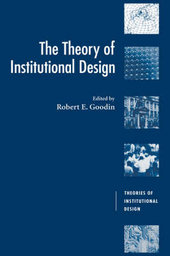
|
The Theory of Institutional Design
Hardback
Main Details
| Title |
The Theory of Institutional Design
|
| Authors and Contributors |
Edited by Robert E. Goodin
|
| Series | Theories of Institutional Design |
|---|
| Physical Properties |
| Format:Hardback | | Pages:304 | | Dimensions(mm): Height 237,Width 163 |
|
| ISBN/Barcode |
9780521471190
|
| Classifications | Dewey:320.011 |
|---|
| Audience | | Professional & Vocational | | Tertiary Education (US: College) | |
|---|
|
Publishing Details |
| Publisher |
Cambridge University Press
|
| Imprint |
Cambridge University Press
|
| Publication Date |
26 January 1996 |
| Publication Country |
United Kingdom
|
Description
Problems of institutional design and redesign, structuring and restructuring, acquired particular poignancy through recent developments from eastern Europe to southern Africa. At the same time, scholars in each of several disciplines - political science, economics, sociology, history and philosophy - have increasingly come to appreciate the important independent role that is, and should be, played by institutional factors in social life. In this volume, disparate theories of institutional design given by each of those several disciplines are synthesized and their peculiar power illustrated. Through analysis of examples ranging from changes in the British welfare state through the transition of eastern European societies to the reward structure of the modern university, the contributors emphasize the important interpenetration of normative and empirical issues in theories of institutional design.
Reviews'The Theory of Institutional Design is required reading for the many people, in many fields, who are interested in the effects of institutions on social life. It is an exceptionally good introduction to the field, and because the interdisciplinary essays are state-of-the-art, it is an important and original contribution as well.' Cass Sunstein, University of Chicago 'Institutional analysis is central to the contemporary social sciences, but is still not adequately understood. Robert Goodin has advanced that understanding with this book on institutional design. The book integrates the approaches of several social science disciplines and relates those approaches to fundamental theoretical and normative questions. Professor Goodin raises a number of questions about the possibilities of the purposive design of institutions, and the process of institutionalization. This is a major contribution to the literature that should be read by all students of social and political theory.' B. Guy Peters, University of Pittsburgh
|